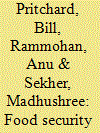| Srl | Item |
| 1 |
ID:
053713


|
|
|
| 2 |
ID:
121112


|
|
|
|
|
| Publication |
2013.
|
| Summary/Abstract |
Contemporary India possesses a food security paradox-progress in combating food insecurity is occurring at a slower pace than might be expected, given the nation's rapid economic growth. This paper provides a conceptual framework to explain this phenomenon. Drawing on the work of Amartya Sen, it uses a broadly framed analysis to conceptualise the problem in terms of the interactivity between three types of entitlement failure. Firstly, pure exchange system entitlement (abilities to obtain food from welfare programmes) has been curtailed by institutional shortcomings in pivotal programmes. Secondly, opportunities for wage-labour entitlement (abilities to obtain food from monetary incomes) have been restricted for vulnerable households because of the sequencing and geographical patterning of recent economic growth in India. Thirdly, opportunities for vulnerable households to address their needs through own-production entitlement (abilities to grow one's own food) have been curbed by land fragmentation and environmental degradation. These interactions have created vicious cycles of food insecurity for vulnerable households. Through this approach, the deeper causal roots of India's food security paradox are articulated, thus underscoring the importance of multi-pronged, holistically constructed policy agendas.
|
|
|
|
|
|
|
|
|
|
|
|
|
|
|
|
| 3 |
ID:
136260


|
|
|
|
|
| Summary/Abstract |
In this paper, we use data from the China Health and Nutrition Survey (CHNS) to examine if there are any gender differences in child anthropometric outcomes among rural Chinese children, explicitly taking into account the role of China's family planning policies. Our analysis shows that although there have been improvements in the child anthropometric measures height-for-age and weight-for-age over the last two decades, children, particularly girls from non-one child households have adverse nutritional outcomes. These gender differences persist in two-child households, where boys have better height-for-age outcomes when their sibling is a male rather than a female. Our decomposition model finds that there is a large unexplained component, which may be attributed to gender discrimination against the girl child.
|
|
|
|
|
|
|
|
|
|
|
|
|
|
|
|